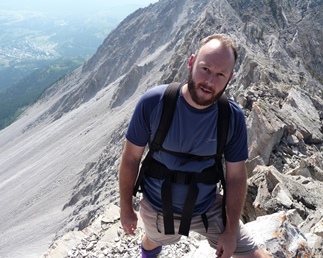| Home | Emslie CV | Research | Publications | Conferences | People | X-Ray Structures | Techniques | Journals | Links |

Jan 2019 - Kasuni joins as a new grad student. Welcome! Dec 2018 - Emslie lab moves into new renovated lab space on the 4th floor. Lots of work, but worth it! Nov 2018 - Almost the whole group at the IDW in Waterloo. Aathith wins 2nd place for the Best Oral Presentation at the conference. Oct 2018 - Majeda wins 3rd place in the NanoCanada 2018 Best Poster Award competition at the Innovation 360 NanoTEC for Smart Communities conference. Sept 2018 - Welcome to new grad students Novan and Declan. Sept 2018 - Welcome to new CHEM 4G09 and CHEM 3RP3 students Eliza-Jayne and Seja. Aug 2018 - Jeff's Mn-ethyl paper is accepted to Organometallics. Aug 2018 - Jeff travels to the ICOMC in Florence, Italy and gives a talk in the "Early TM Organometallic Synthesis" symposium. June 2018 - Majeda transfers to the PhD program. June 2018 - Jeff receives a Chemistry Impact award for his 2017 Angewandte paper. June 2018 - Kelly and Aathith's patent filed. March 2018 - Majeda receives an NSERC PGS-D Award. Great work! March 2018 - Novan wins "Best Undergraduate Thesis Presentation" award. Go Novan! March 2018 - Nick and Tara's thorium alkyl/allyl paper accepted in Dalton Trans. Feb 2018 - Brad's last 2 papers accepted (Organometallics and Can. J. Chem.). Jan 2018 - Jeff wins a Russell Bell Travel Award to attend the ICOMC in Florence, Italy this year. Congratulations! Dec 2017 - Carlos (ex PhD now at Chevron Phillips) back to visit the lab. Dec 2017 - Group Christmas dinner on Locke St. Nov 2017 - Kelly PhD graduation. Oct 2017 - Jeff wins the Ronald J. Gillespie Prize for 2016-2017. Congratulations! Sept 2017 - Kevin (Ya-Dong) Yu starts as a visiting student from China (visiting for 1 year at the end of his PhD). Welcome! Sept 2017 - Novan and Andrew start as 4G09s. August 2017 - Kelly successfully defends PhD. June 2017 - Nick PhD graduation. Congrats! June 2017 - Flurrry of X-ray structures for Katia!! May 2017 - Another of Kelly's papers accepted. And another... And one more... May 2017 - Our front cover for the "100th Anniversary of the Canadian Society for Chemistry" issue of Angewandte Chemie is now on line. May 2017 - Novan is back in the group as a summer student. May 2017 - Nick successfully defends PhD. April 2017 - Katia gives a great colloqium talk. April 2017 - Jeff obtains 5 new X-ray structures after a short dought. April 2017 - Two more of Kelly's papers submitted in 2 days! April 2017 - NSERC RTIs for an EPR spectrometer and a TGA-DSC/MS (led by Gillian Goward and Alex Adronov, respectively) are successfu! Great news for the group. March 2017 - Kelly's Y hydroamination paper accepted to organometallics. March 2017 - Nick starts work as a PDF in the group working on new approaches in CVD. Feb 2017 - Katia successfully transfers into the Ph.D. program. Congratulations! Feb 2017 - Nick finishes writing his PhD thesis. Feb 2017 - Jeff's Mn silylene/silene paper accepted as a VIP in Angewandte! Jan 2017 - Majeda is trained to run spectroscopic ellipsometry. A new technique for the group!! Jan 2017 - Novan starts in the group as research practicum (3RP3) student. Welcome! |
|
Welcome to the Emslie Group Webpage |
|
Research in the Emslie group is focused on: (1) Highly rigid ligand actinide complexes: organometallic reactivity and catalysis, small molecule activation, redox chemistry, structural and bonding studies. Future work may also include applications in lanthanide/actinide separation. (2) Late transition metal ambiphilic ligand complexes; synthesis, structures, stoichiometric reactivity, and catalysis. (3) The development of new organometallic reactivity for metal Atomic Layer Deposition (ALD): new volatile precursor synthesis, solution deposition reactions, mechanistic studies, and ALD reactor studies. As a consequence, the Emslie research program (as a whole) involves early and late transition metal, actinide and main group chemistry, coordination, organometallic and materials chemistry, organic ligand synthesis, catalysis, small molecule activation and ALD. The breadth of research carried out in the group provides students/PDFs with a uniquely broad background and skillset. Students interested in joining the group typically have a choice between several different research areas, which can differ significantly (e.g. more exploratory vs more applied research, substantial vs minimal new ligand synthesis, mainly organometallic vs coordination chemistry, transition metal vs f-element chemistry etc.). However, the Emslie group is a synthetic inorganic chemistry group, so the major focus (typically >80%) of all projects is molecular synthesis (mostly air-sensitive; in some cases extremely air-sensitive). Chemistry in the Emslie lab also relies heavily on the synthesis of new ligands (often containing B, Al, P, S, etc.) which requires a significant level of skill in organic synthesis and provides students with experience in techniques of importance in most chemistry laboratories. Members of the Emslie group run and interpret data from a wide variety of techniques including: 1D, 2D, multinuclear and VT NMR spectroscopy, IR, NIR and UV-Vis spectroscopy, ALD reactor studies, GC-MS, HRMS, TGA, electrochemistry, and combustion elemental analysis. Students in the group also have the option to solve their own Xray crystal structures and perform DFT calculations. Overall, this experience provides students/PDFs with the skills required to identify and study almost any molecular compound.
|
David J. H. Emslie, Professor, Department of Chemistry & Chemical Biology, McMaster University, 1280 Main Street West, Hamilton, ON, L8S 4M1, Canada.
Office: ABB-450, Tel: (905) 525-9140 x 23307
